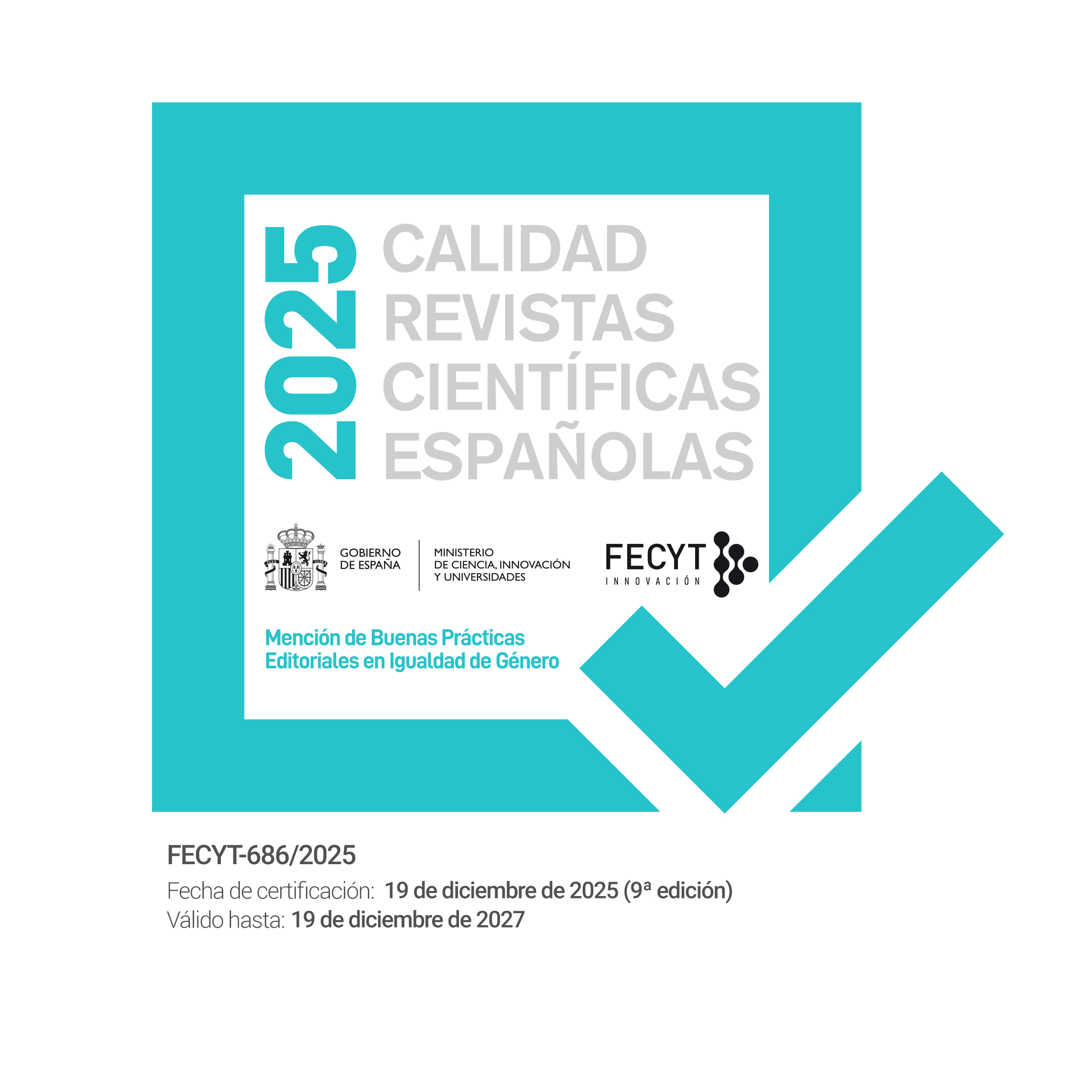La relación entre inteligencia emocional y personalidad en estudiantes universitarios españoles.
DOI:
https://doi.org/10.55414/ap.v39i2.903Palabras clave:
Inteligencia emocional, Personalidad, Cinco Grandes, Educación SuperiorResumen
El objetivo de esta investigación es analizar la relación entre la inteligencia emocional y el modelo de personalidad de los Cinco Grandes. Una muestra de 430 estudiantes universitarios con edades comprendidas entre los 18 y los 69 años (M = 21’41; DT = 4’99) completaron el Trait Meta Mood Scale (TMMS-24; Salovey, Mayer, Goldman et al., 1995) y el Ten Item Personality Inventory (TIPI; Gosling, Rentfrow y Swann, 2003). El análisis de correlación realizado muestra cierto solapamiento entre las dimensiones de la inteligencia emocional y los factores de los Cinco Grandes. Los resultados de los análisis de regresión están en línea con el modelo de inteligencia emocional rasgo y apoyan la asociación entre determinados factores de los Cinco Grandes (particularmente extraversión y estabilidad emocional) y las dimensiones de la inteligencia emocional. El presente estudio contribuye a expandir la literatura sobre las relaciones entre la inteligencia emocional y la personalidad. Palabras clave: inteligencia emocional, personalidad, Cinco Grandes, educación superior.Descargas
Referencias
Augusto Landa, J.M., Pulido Martos, M. y López-Zafra, E. (2010). Emotional intelligence and personality traits as predictors of psychological well-being in Spanish undergraduates. Social Behavior and Personality: An International Journal, 38(6), 783-793 [DOI: 10.2224/sbp.2010.38.6.783].
Barraza-López, R.J., Muñoz-Navarro, N.A. y Behrens-Pérez, C.C. (2017). Relación entre inteligencia emocional y depresión-ansiedad y estrés en estudiantes de Medicina de primer año. Revista Chilena de Neuro-Psiquiatría, 55(1), 18-25 [DOI: 10.4067/s0717-92272017000100003].
Cabello, R., Navarro Bravo, B., Latorre, J.M. y Fernández-Berrocal P. (2014). Ability of university-level education to prevent age-related decline in emotional intelligence. Frontiers in Aging Neuroscience, 6, 37 [DOI: 10.3389/fnagi.2014.00037].
Cabello, R., Sorrel, M.A., Fernández-Pinto, I., Extremera, N. y Fernández-Berrocal, P. (2016). Age and gender differences in ability emotional intelligence in adults: A cross-sectional study. Developmental Psychology, 52(9), 1486-1492 [DOI: 10.1037/dev0000191].
Chopik, W.J. y Kitayama, S. (2018). Personality change across the life span: Insights from a cross‐cultural, longitudinal study. Journal of Personality, 86(3), 508-521 [DOI: 10.1111/jopy.12332].
Conrad, N. y Patry, M.W. (2012). Conscientiousness and academic performance: A mediational analysis. International Journal for the Scholarship of Teaching and Learning, 6(1), 8 [DOI: 10.20429/ijsotl.2012.060108].
Costa, P.T.Jr. y McCrae, R.R. (1992). Revised NEO Personality Inventory (NEO-PI-R) and NEO Fiv Factor Inventory (NEO-FFI) Professional Manual. Odessa, FL: Psychological Assessment Resources.
Damian, R.I., Spengler, M., Sutu, A. y Roberts, B.W. (2019). Sixteen going on sixty-six: A longitudinal study of personality stability and change across 50 years. Journal of Personality and Social Psychology, 117(3), 674-695 [DOI: 10.1037/pspp0000210].
DeYoung, C.G., Quilty, L.C., Peterson, J.B. y Gray, J.R. (2014). Openness to experience, intellect, and cognitive ability. Journal of Personality Assessment, 96(1), 46-52 [DOI: 10.1080/00223891.2013.806327].
Fernández-Berrocal, P. y Extremera, N. (2006). Emotional intelligence: A theoretical and empirical review of its first 15 years of history. Psicothema, 18, 7-12.
Fernández-Berrocal, P., Extremera, N. y Ramos, N. (2004). Validity and reliability of the Spanish modified version of the Trait Meta-Mood Scale. Psychological Reports, 94(3), 751-755 [DOI: 10.2466/pr0.94.3.751-755].
Ghiabi, B. y Besharat, M.A. (2011). An investigation of the relationship between personality dimensions and emotional intelligence. Procedia-Social and Behavioral Sciences, 30, 416-420 [DOI: 10.1016/j.sbspro.2011.10.082].
Gosling, S.D., Rentfrow, P.J. y Swann, W.B. (2003). A very brief measure of the Big-Five personality domains. Journal of Research in Personality, 37(6), 504-528 [DOI: 10.1016/s0092-6566(03)00046-1].
Greven, C., Chamorro-Premuzic, T., Arteche, A. y Furnham, A. (2008). A hierarchical integration of dispositional determinants of general health in students: The Big Five traits, emotional intelligence and humour styles. Personality and Individual Differences, 44(7), 1562-1573 [DOI: 10.1016/j.paid.2008.01.012].
Komarraju, M. y Karau, S.J. (2005). The relationship between the Big Five personality traits and academic motivation. Personality and Individual Differences, 39(3), 557-567 [DOI: 10.1016/j.paid.2005.02.013].
MacCann, C., Jiang, Y., Brown, L.E., Double, K.S., Bucich, M. y Minbashian, A. (2020). Emotional intelligence predicts academic performance: A meta-analysis. Psychological Bulletin, 146(2), 150-186 [DOI: 10.1037/bul0000219].
Mayer, J.D. y Salovey, P. (1997). What is emotional intelligence? En P. Salovey y D.J. Sluyter (Eds.), Emotional development and emotional intelligence: Implications for educators (pp. 3-31). Nueva York: Basic Books.
Oshio, A. (2018). Who shake their legs and bite their nails? Self-reported repetitive behaviors and Big Five personality traits. Psychological Studies, 63(4), 384-390 [DOI: 10.1007/s12646-018-0462-x].
Oshio, A., Abe, S., Cutrone, P. y Gosling, S.D. (2013). Big Five content representation of the Japanese version of the ten-item personality inventory. Psychology, 4(12), 924-929 [DOI: 10.4236/psych.2013.412133].
Parodi Úbeda, A., Belmonte Lillo, V., Ferrándiz García, C. y Ruiz Melero, M.J. (2017). La relación entre la inteligencia emocional y la personalidad en estudiantes de Educación Secundaria. International Journal of Developmental and Educational Psychology. Revista INFAD de Psicología, 2(1), 137-144 [DOI: 10.17060/ijodaep.2017.n1.v2.926].
Pérez-González, J.C. y Sánchez-Ruiz, M.J. (2014). Trait emotional intelligence anchored within the Big Five, Big Two and Big One frameworks. Personality and Individual Differences, 65(1), 53-58. https://doi.org/10.1016/j.paid.2014.01.021
Petrides, K.V. y Furnham, A. (2000). On the dimensional structure of emotional intelligence. Personality and Individual Differences, 29(2), 313-320 [DOI: 10.1016/S0191-8869(99)00195-6].
Descargas
Publicado
Número
Sección
Licencia
Derechos de autor 2021 APUNTES DE PSICOLOGÍA

Esta obra está bajo una licencia internacional Creative Commons Atribución-NoComercial-SinDerivadas 4.0.



























